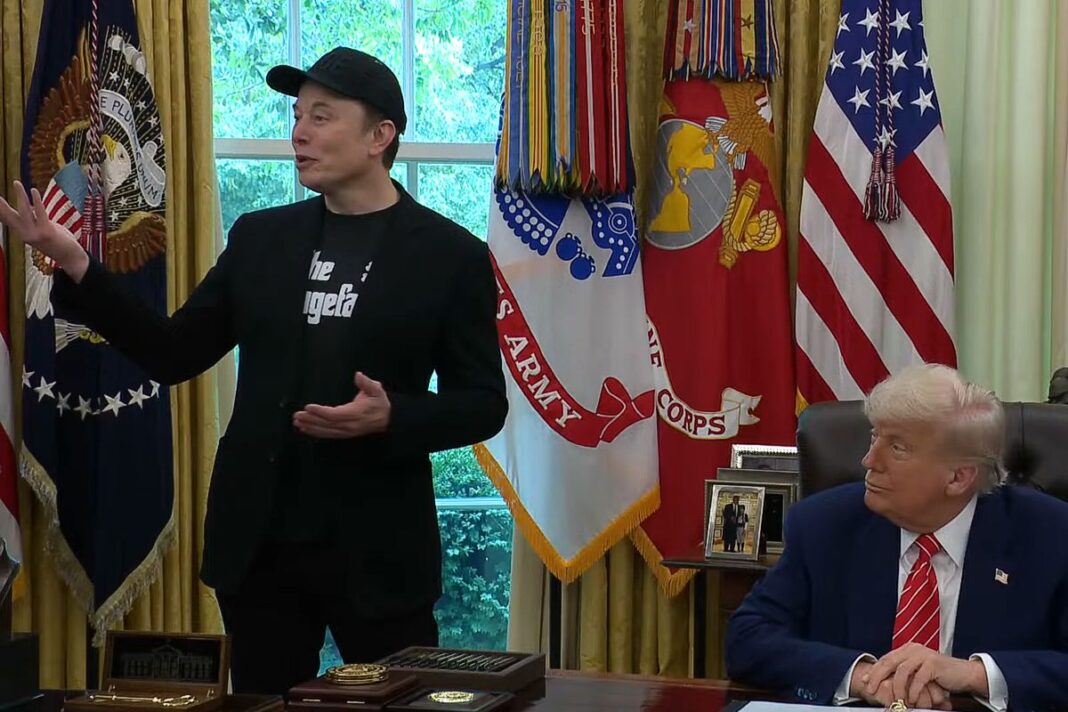As a steadfast supporter of both President Donald Trump and Elon Musk, the recent public feud between these two titans of American innovation and leadership has been disheartening. Their alliance, once a beacon of hope for a bold, America-first agenda, has fractured over disagreements about Trump’s signature tax and spending bill, dubbed the “Big, Beautiful Bill.” The fallout, marked by heated social media exchanges and threats of economic retaliation, has left many of us wondering how two men who share so much vision for the nation’s future could find themselves at odds. Yet, in the ashes of this conflict lies an opportunity for reconciliation—one that could strengthen their partnership and propel America toward greatness. Let’s unpack the feud and explore a path forward for these two giants to mend their relationship for the benefit of the country.
The feud erupted when Musk, fresh off his tenure leading the Department of Government Efficiency (DOGE), publicly criticized Trump’s tax and spending bill as a “disgusting abomination” that would balloon the federal deficit. Trump, who views the bill as a cornerstone of his domestic agenda, took the criticism personally, expressing disappointment and suggesting Musk’s reaction stemmed from the bill’s elimination of electric vehicle subsidies critical to Tesla. The exchange escalated rapidly, with Trump threatening to terminate government contracts with Musk’s companies, including SpaceX, and Musk retaliating with claims about Trump’s alleged ties to Jeffrey Epstein’s files. The speed and venom of the fallout were shocking, especially given their recent camaraderie, exemplified by Trump’s ceremonial send-off for Musk in the Oval Office just days prior.
At its core, this feud seems rooted in a clash of priorities and communication styles. Trump, a political juggernaut, is focused on delivering tangible wins for his base, including tax cuts and economic growth, even if it means short-term increases in the deficit. His “Big, Beautiful Bill” is a bold, all-encompassing package designed to reshape the economy, and he sees it as a legacy-defining achievement. Musk, on the other hand, is a fiscal hawk whose time at DOGE reinforced his belief that unchecked government spending is an existential threat. His criticism of the bill reflects his commitment to long-term economic stability, a stance that aligns with his broader mission to innovate for humanity’s future. Both men are driven by a desire to make America stronger, but their approaches—Trump’s pragmatic deal-making versus Musk’s principled cost-cutting—have collided.
The personal nature of the feud has only deepened the rift. Trump, known for his loyalty-driven leadership, likely feels betrayed by Musk’s public attacks, especially after giving him unprecedented influence in the administration. Musk, who thrives on intellectual independence, may have been stung by Trump’s dismissal of his concerns and the threat to his companies’ contracts, which are vital to SpaceX’s mission and Tesla’s growth. The Epstein allegations, while inflammatory, seem more like a desperate jab from Musk than a substantive claim, reflecting the emotional intensity of the moment. Both men, with their larger-than-life egos, have let pride and miscommunication spiral into a public spectacle that risks undermining their shared goals.
For the sake of the country, Trump and Musk must find a way to reconcile. Their partnership has already proven transformative—Musk’s financial and technological support helped secure Trump’s 2024 victory, while Trump’s platform gave Musk a stage to push for government reform. Together, they can tackle America’s biggest challenges: revitalizing the economy, securing energy independence, and maintaining global leadership in technology and space exploration. A prolonged feud, however, could fracture the Republican coalition, weaken congressional support for Trump’s agenda, and embolden adversaries who relish seeing America’s most powerful figures divided.
The first step toward mending this relationship is a private, face-to-face meeting, away from the glare of social media. Trump, as the leader of the free world, could extend an olive branch by inviting Musk to Mar-a-Lago or the White House for a candid discussion. This gesture would signal respect for Musk’s contributions while allowing Trump to explain the political realities behind the bill. Musk, in turn, must approach the meeting with humility, acknowledging that his public criticism may have crossed a line. A direct conversation could clear the air, rebuild trust, and remind both men of their shared commitment to America’s success.
Next, they should focus on finding common ground within their policy differences. Trump could offer to work with Musk on a supplemental bill that addresses deficit concerns, perhaps by identifying specific spending cuts or reforms that align with DOGE’s mission. Musk, for his part, could publicly endorse aspects of Trump’s agenda that align with his vision, such as deregulation or infrastructure modernization, to show unity. By collaborating on a shared project—say, a national initiative to accelerate clean energy innovation or space exploration—they could channel their energies into a positive, forward-looking partnership that inspires the nation.
Both men must commit to a mutual code of conduct that prioritizes discretion and loyalty. Trump thrives on public loyalty, and Musk’s social media broadsides, while authentic to his style, undermine that dynamic. Musk could agree to voice concerns privately, while Trump could pledge to shield Musk’s companies from retaliatory actions, recognizing their strategic importance to America’s technological edge. By setting clear expectations, they can prevent future misunderstandings from escalating into public battles.
The Trump-Musk feud is a clash of titans, but it’s also a test of their leadership. America needs both men at their best—Trump steering the nation with unwavering resolve, and Musk pushing the boundaries of what’s possible. Their reconciliation would not just heal a personal rift; it would send a powerful message that even the fiercest disagreements can be overcome for the greater good. By meeting privately, aligning on policy, and committing to mutual respect, Trump and Musk can restore their alliance and lead America into a new era of prosperity and innovation.








